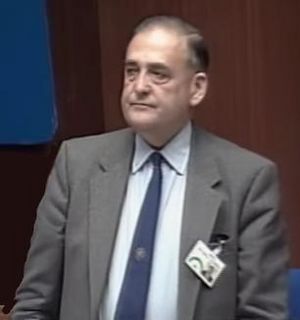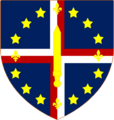Geoffrey Finsberg facts for kids
Quick facts for kids
The Lord Finsberg
|
|
|---|---|
 |
|
| Member of Parliament for Hampstead & Highgate (Hampstead 1970-1983) |
|
| In office 18 June 1970 – 16 March 1992 |
|
| Preceded by | Benjamin Whitaker |
| Succeeded by | Glenda Jackson |
| Personal details | |
| Born | 13 June 1926 Hampstead, London |
| Died | 8 October 1996 (aged 70) Stockholm, Sweden |
| Political party | Conservative |
| Spouses |
Pamela Benbow Hill
(m. 1969; Yvonne Elizabeth Sarch (née Wright)
(m. 1990) |
Geoffrey Finsberg, Baron Finsberg (born 13 June 1926 – died 8 October 1996) was a British politician. He was a member of the Conservative Party. He served as a Member of Parliament (MP) for Hampstead from 1970 to 1983. Later, he represented Hampstead & Highgate from 1983 until 1992.
Contents
Geoffrey Finsberg's Early Life
Geoffrey Finsberg was born in Hampstead, London, in 1926. His family was Jewish and supported the Conservative Party. He went to Hendon County Grammar School and the City of London School.
During World War II, from 1944 to 1947, Finsberg worked in coal mines. He was a "Bevin Boy", which was a special program where young men helped with coal production during the war. He worked at Glapwell colliery in Derbyshire. In 1993, he became the first president of the Bevin Boys Association.
Starting in Politics: Local Government
Geoffrey Finsberg became involved in the Conservative Party when he was young. He helped start the Young Conservatives group in Mansfield in 1946. Later, he became the chairman of the Young Conservatives in Hampstead when he was 22.
Becoming a Local Councillor
Before he turned 23, Finsberg was elected as a councillor for the Metropolitan Borough of Hampstead in 1949. A councillor is someone elected to represent people in a local area. He also joined the Executive Committee of the National Union of Conservative and Unionist Associations, which is a key part of the Conservative Party. He held this role until 1979.
Finsberg wanted to become a Member of Parliament. He helped Henry Brooke become the MP for Hampstead in 1950. Brooke later became the Home Secretary, a very important government role.
In 1953, Finsberg became a councillor for a different area in Hampstead, called Central ward. He was very popular and was re-elected several times. In 1955, he tried to become an MP for Islington East, but he did not win. From 1954 to 1957, he was the National Chairman of the Young Conservatives.
Leading in Local Government
In 1962, Finsberg became a Justice of the Peace (JP) for Inner London. A JP is a volunteer who helps with local court cases.
In 1965, London's local areas were changed. Finsberg became a councillor for the new Borough of Camden. He was elected in 1964 and became the Leader of the Council in 1968. He held this important leadership role until 1970. He remained a Camden councillor until 1974.
He also held leadership positions in the Association of Municipal Corporations, which represented local councils. People who worked with him said he understood how local government worked very well.
Serving in Parliament: A National Role
First Steps as an MP
In the 1970 general election, Geoffrey Finsberg was elected as the Member of Parliament for Hampstead. He won by a small number of votes against the Labour MP Benjamin Whitaker. Finsberg was so proud of his victory that he had the number of votes he won by, '474', stamped on his car's number plate!
As an MP, he joined the Select Committee on Expenditure, which looked at how the government spent money. He was also a spokesman for the Conservative Party on matters related to Greater London from 1974 to 1979. He was also a Vice-Chairman of the Conservative Party Organisation from 1975 to 1979.
Working for the Government
Finsberg's election wins were often very close. In the 1979 general election, he won against Ken Livingstone, who later became the Mayor of London.
After the Conservatives won the election, Finsberg served in two junior government roles. He was a Parliamentary Under Secretary of State for the Department of the Environment (1979–81) and then for the Department of Health and Social Security (1981–83). These roles meant he helped ministers manage important government departments.
International Work and Retirement
In 1983, the boundaries of his constituency changed. He became the MP for Hampstead and Highgate. He won this election against another Labour politician, John McDonnell. He again became a Vice-Chairman of the Conservative Party Organisation, a role he held until 1987.
Finsberg also worked on international matters. In 1983, he became a member of the Parliamentary Assembly of the Council of Europe and the Western European Union. These groups work to promote peace and cooperation in Europe. He became the leader of the UK delegation in 1987. From 1991 to 1992, he was the President of the Parliamentary Assembly of the Council of Europe.
He was also a founding Vice-Chairman of Conservative Friends of Israel, a group that supports Israel. He even voted against his own party's government during the 1973 Yom Kippur War because he disagreed with their policy on an arms embargo.
Finsberg retired from Parliament in 1992. His seat was then won by Labour's Glenda Jackson. After retiring, he was made a life peer and became Baron Finsberg, which meant he could sit in the House of Lords.
Beyond Politics: Other Important Roles
Outside of his political work, Finsberg was involved in business and charities. He worked at Great Universal Stores in human resources from 1968 to 1979. He was also involved with the Trustee Savings Bank (TSB) and the Post Office Users National Council. He was a member of the Council of the Confederation of British Industry (CBI), which represents businesses.
He was a Vice-President of the Association of Municipal Corporations. He also helped lead the Council of Christians and Jews, which promotes understanding between different faiths. He was a patron of the Maccabi Association of Great Britain, a Jewish sports organization. In 1993, he became a trustee of the Marie Curie Cancer Foundation, a charity that helps people with cancer. He was also a governor of University College School in Hampstead.
Awards and Recognition
Finsberg received several honours for his work. In 1959, he was made a Member of the Order of the British Empire (MBE). This award recognizes contributions to the arts, sciences, charity, or public service. In 1984, he was knighted, which meant he could use the title "Sir".
He also received awards from other countries. In 1989, he was given Austria's Order of Merit. The next year, he became a Commander of the Order of Isabella the Catholic in Spain.
Personal Life
In 1969, Geoffrey Finsberg married Pamela Benbow Hill. She passed away in 1989. The following year, he married Yvonne Elizabeth Sarch. He did not have any children.
Finsberg enjoyed playing bridge and reading in his free time. He was a member of the Carlton Club and the Marylebone Cricket Club. He lived in South Hampstead, which was part of his old constituency.
Geoffrey Finsberg passed away on 8 October 1996, at the age of 70, in Stockholm, Sweden.
Images for kids



